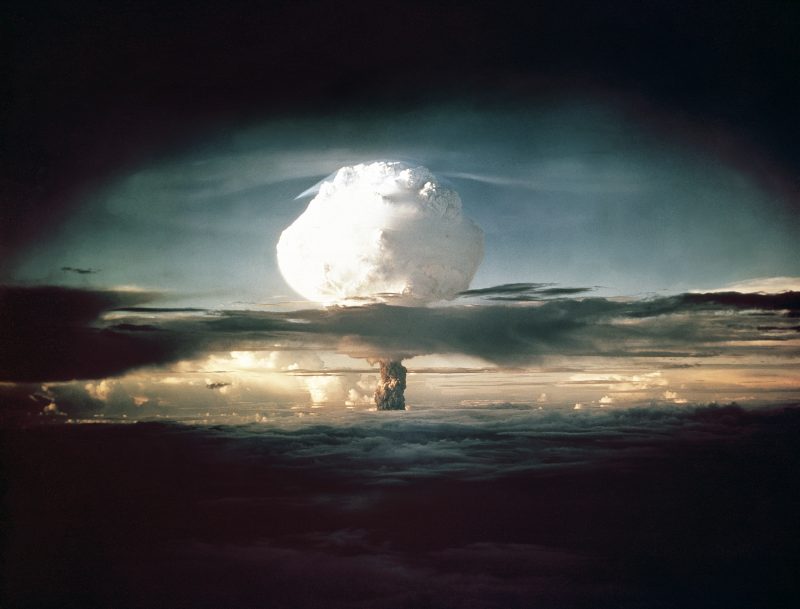For a while now, Donald Trump has downplayed the risks of climate change by playing up what he describes as a more urgent threat: nuclear weapons.
“When I listen to people talk about global warming, that the ocean will rise in the next 300 years by one-eighth of an inch, and they talk about, ‘This is our problem’ — our big problem is nuclear warming,” he said during a Fox News interview last year. “Nobody even talks about it.”
“The biggest problem we have in the whole world,” he added later, “it’s not global warming. It’s nuclear warming.” He has at times called nuclear weapons “the n-word,” as though the subject is so dangerous that it can’t be discussed in polite company.
Much of this is rhetorical. Trump knows that Republicans don’t view climate change as an urgent concern, so he dismisses it as ridiculous in favor of a more obvious danger (and one that resonates with a Republican base that largely grew up during the Cold War).
This week, though, President Biden engaged with the idea.
“This is the last existential threat, it is climate,” he said at a fundraiser, according to a pool report. “We have a crazy SOB like that guy [Russian President Vladimir] Putin and others, and we always have to worry about nuclear conflict, but the existential threat to humanity is climate.”
Biden, too, is making a political point, offering an explicit contrast with Trump. So let’s consider it as a point of political debate. Which is the more potent existential threat, nuclear weapons or climate change?
To answer the question, we turned to experts on the subject: the Center for the Study of Existential Risk at the University of Cambridge.
The best place to start is by defining what we mean by “existential.” In a video call, SJ Beard, a senior research associate at CSER, explained how the organization considered the idea.
“We tend to look at two things,” Beard said. “One of them is full-on human extinction. The other is global societal collapse.”
As Beard pointed out, those two outcomes are not necessarily disconnected.
“When you look at the kind of systemic complexity that all of us rely upon — the technologies, the food distribution systems, the power networks — and the many ways in which things can fail,” Beard explained, “it’s a level of certainty that I’m not willing to give to say, for sure things won’t be impacted on such a level as to threaten the existence of humanity.”
According to Beard, there’s a ballpark ratio that can be applied to any disaster: For every person killed, another nine suffer some sort of injury or other negative impact. If there were an event that wiped out 10 percent of the world’s population, then we’d expect everyone else to have a direct negative effect. Beyond, of course, the trauma of about 800 million people dying.
So with that baseline, whose existential threat does Beard view as the bigger risk, Trump’s or Biden’s?
“The problem is they’re just incredibly different kinds of risk,” Beard began, fairly. The difference, though, is mainly one of timelines. The damage done by climate change accrues slowly, chronically. It’s accruing now, as Beard noted. The threat of nuclear weapons is, to put it dryly, acute. In each case, there would be (or, in the case of climate change, are) risks to food supplies, forced relocations, interruptions to power production and so on. It’s just that it happens very rapidly in the wake of a nuclear exchange.
“Right now, nuclear weapons are much more likely to have really global catastrophic effects than climate change,” Beard said. “But in 100 years’ time, the effects of climate change may have added up to what we would experience with a nuclear war.”
Beard did take issue with the idea that the threat from nuclear weapons was solely derived from rogue states like Russia.
“People tend to worry about bad actors,” Beard said. “They worry that Putin is going to get angry and launch nuclear weapons at Ukraine or something. Actually, a lot of the worry is accidental.” In 1979, for example, a computer tape from a war-game exercise was put into a NORAD computer, triggering an alert that nearly led the United States to launch a counterstrike against an imaginary Russian attack. In 1983, a similar false alarm almost led to a Russian launch. So while there might be no danger of nuclear war over the next century, the existence of nuclear weaponry systems maintains the risk of a detonation anyway.
Asked which existential threat seemed more likely to unfold, Beard demurred.
“When we talk about risk, we’re really talking about what specific people are going to do,” Beard said. “And I don’t think we should talk about that in probabilistic terms.”
In the wake of the Cuban missile crisis, Beard noted, President John F. Kennedy and Russian leader Nikita Khrushchev began having more intimate discussions about the threat nuclear weapons posed to the world — a recognition that neither leader alone could fully address the challenge. It’s similar to how climate change must be addressed: through collective international action, given the nature of the problem.
“What I would want to see any political leader doing is connecting with the humanity of their electorate, but also the humanity of leaders elsewhere in the world,” Beard said, “because ultimately none of these things are in anyone’s interest.”
It’s safe to assume that Beard wouldn’t want to offer odds on that happening, either.





























